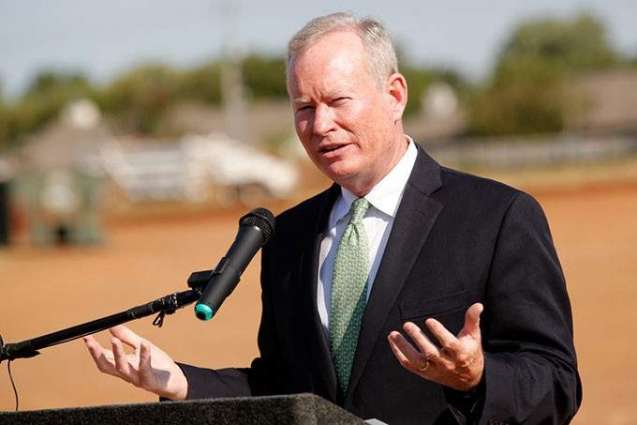As the world continues to urbanise at an unprecedented rate, cities have come to wield more power and significance than ever before, Mick Cornett, a former four-term Mayor of Oklahoma City and author of the recent book, The Next American City, told a lecture hosted at the Majlis Mohamed bin Zayed on Wednesday
ABU DHABI, (Pakistan Point News - 06th Feb, 2019) As the world continues to urbanise at an unprecedented rate, cities have come to wield more power and significance than ever before, Mick Cornett, a former four-term Mayor of Oklahoma City and author of the recent book, The Next American City, told a lecture hosted at the Majlis Mohamed bin Zayed on Wednesday.
During the course of his lecture, titled 'Building the Cities of Tomorrow', hosted at Al Bateen Palace in Abu Dhabi, Cornett said that currently over half the world’s population lives in cities and that is expected to grow to 70 per cent by 2050. And yet, if that trend holds true, as much as 60 per cent of our future urban space has yet to be built. Terming urbanisation as the greatest force shaping our future, Cornett said how we build our cities today will shape the way we live for generations.
The lecture was attended by His Highness Sheikh Hamed bin Zayed Al Nahyan, Chief of the Abu Dhabi Crown Prince Court, as well as other dignitaries.
Cornett said modern cities serve as vital hubs of innovation, culture and commerce. But while their population, wealth and political power may be enormous, so too are the scale and complexity of their challenges. Yet, as the example of Oklahoma City proves, these challenges can be successfully met and a city can be transformed. Described by one of his peers as a giant among American mayors, Cornett turned his city, psychologically devastated by the terrorist bombing of April 1995, into one of the most vibrant and economically booming cities in the US.
What’s more, inspired by his own significant weight loss, Cornett spearheaded efforts to motivate his city’s residents to lose one million Pounds in excess weight. As mayor from 2004 to 2018, he also oversaw significant regeneration of the state capital’s downtown districts through innovative taxation. By the time he gave up the mayor’s post, Cornett had created 100,000 new jobs and over 9,600 new businesses. His other notable achievements include the successful lobbying that helped bring the National Basketball Association, NBA, to his city, giving it its first major sports franchise - the Oklahoma City Thunder - and the passage of the Metropolitan Area Projects Plan 3 (MAPS 3), a $777 million quality-of-life public works and redevelopment programme.
Oklahoma City, which had suffered a banking and financial crash in the 1980s that devastated its economy, had started inching back thanks to the efforts of Cornett’s predecessors by the time he became mayor. It had just started to appear for the first time on nationwide lists such as those ranking cities according to ease of starting a business and landing a job when it was listed as one of the most obese cities in the US in 2006. Cornett realised he was part of the problem and resolved to shed his extra pounds. As he went about this, Cornett began to examine his city, its culture and its infrastructure as he sought to understand why it was struggling with such high rates of obesity. "And I came to the conclusion that we had built an incredible quality of life if you happen to be a car. But if you happen to be a person, you are combating the car seemingly at every turn."
Cornett, who was ranked as the 25th greatest leader in the world by Fortune Magazine in April 2018, came to the realisation that the city itself was contributing to its obesity problem. Its infrastructure and urban planning were such that people were sometimes unable to walk from one place to another, even if they were willing to. First, there was a lack of pavements in many areas of the city, largely because developers had not been required to build pavements along roads. Second, Oklahoma City was spread over a sprawling 1,600 square kilometres. Because land was cheap and well-served by a good network of roads, highways and flyovers, developers had expanded outward. All this had contributed to a sedentary culture - people were simply not in the habit of being active.
Cornett went about "designing the city around people and not cars". The city’s wide streets were narrowed and landscaped, making them more pedestrian-friendly. More bicycle trails and jogging paths were built. The city also approved plans to build hundreds of miles of new paths and pavements throughout the metropolitan area and worked to connect them with libraries, schools, parks and retail centres to encourage everyone to walk. In time, exercising in open public spaces became a free and desirable option, he says.
The former mayor said Oklahoma City has a lot in common with Abu Dhabi, which he called a "progressive city". He said both cities underwent rapid development in the 20th century and both have faced a challenge with obesity, which they have sought to overcome through innovative planning. Cornett said Abu Dhabi had already taken the lead in making its city more walkable and pedestrian-friendly, with numerous walking tracks and cycling tracks being built and healthy food being introduced in schools.
Cornet said the infrastructure of a city should support more healthy lifestyles, adding that individual cities have to figure out for themselves what the best way of financing their redevelopment is. Oklahoma, he said, was full of examples where private business owners cooperate with local government for the betterment of the community. Cornet, who was shortlisted for the 2010 World Mayor prize, eventually ending runner-up, said changes do not take hold overnight. But when well-intentioned leaders in America, Europe or Abu Dhabi decide to work together, positive transformations can take hold successfully and rather fast.




